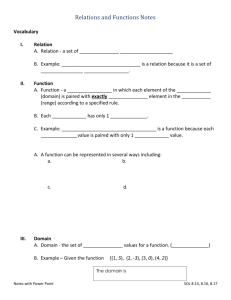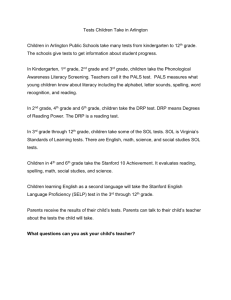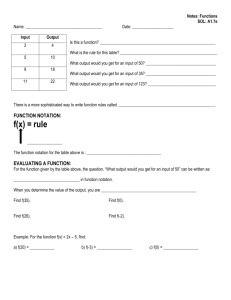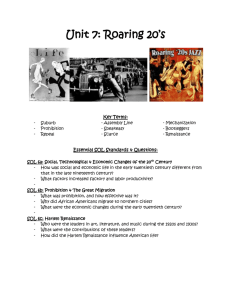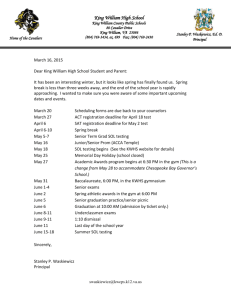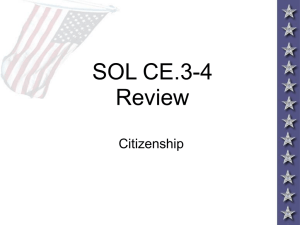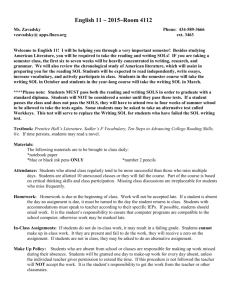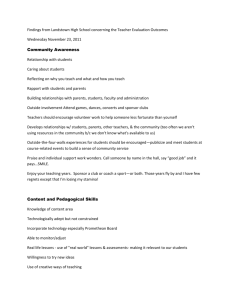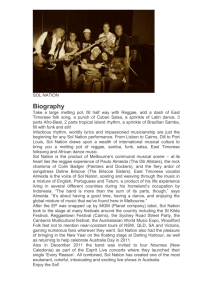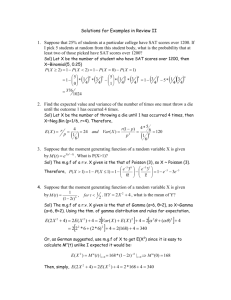The Effects Of Vocabulary Acquisition For Language Minority
advertisement
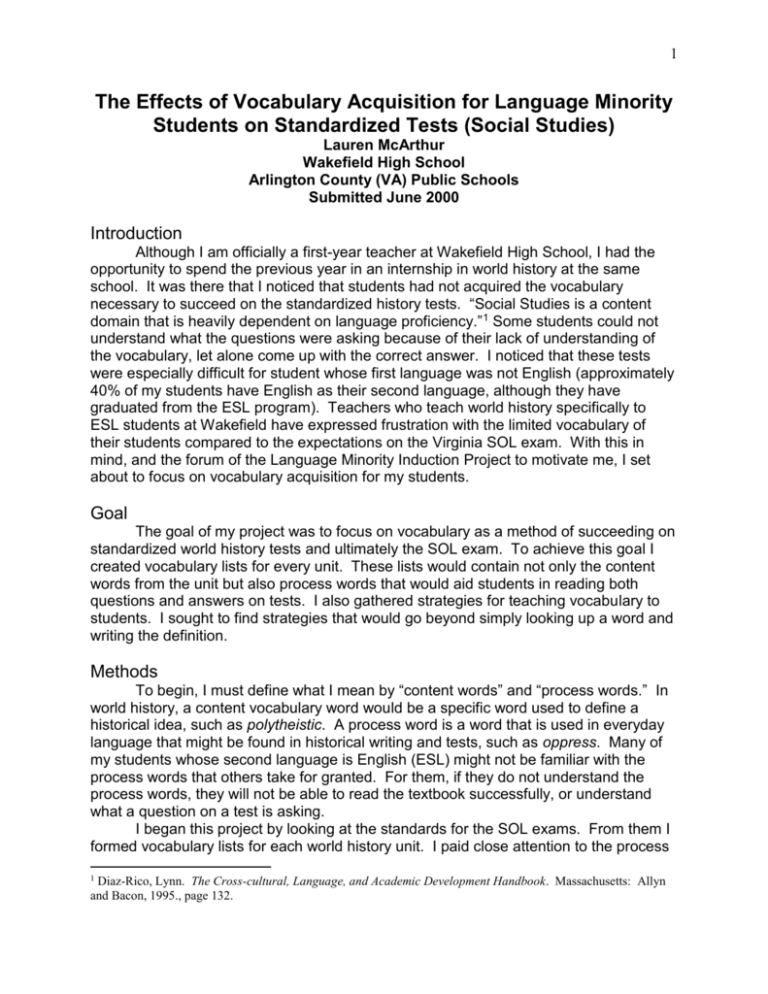
1 The Effects of Vocabulary Acquisition for Language Minority Students on Standardized Tests (Social Studies) Lauren McArthur Wakefield High School Arlington County (VA) Public Schools Submitted June 2000 Introduction Although I am officially a first-year teacher at Wakefield High School, I had the opportunity to spend the previous year in an internship in world history at the same school. It was there that I noticed that students had not acquired the vocabulary necessary to succeed on the standardized history tests. “Social Studies is a content domain that is heavily dependent on language proficiency.” 1 Some students could not understand what the questions were asking because of their lack of understanding of the vocabulary, let alone come up with the correct answer. I noticed that these tests were especially difficult for student whose first language was not English (approximately 40% of my students have English as their second language, although they have graduated from the ESL program). Teachers who teach world history specifically to ESL students at Wakefield have expressed frustration with the limited vocabulary of their students compared to the expectations on the Virginia SOL exam. With this in mind, and the forum of the Language Minority Induction Project to motivate me, I set about to focus on vocabulary acquisition for my students. Goal The goal of my project was to focus on vocabulary as a method of succeeding on standardized world history tests and ultimately the SOL exam. To achieve this goal I created vocabulary lists for every unit. These lists would contain not only the content words from the unit but also process words that would aid students in reading both questions and answers on tests. I also gathered strategies for teaching vocabulary to students. I sought to find strategies that would go beyond simply looking up a word and writing the definition. Methods To begin, I must define what I mean by “content words” and “process words.” In world history, a content vocabulary word would be a specific word used to define a historical idea, such as polytheistic. A process word is a word that is used in everyday language that might be found in historical writing and tests, such as oppress. Many of my students whose second language is English (ESL) might not be familiar with the process words that others take for granted. For them, if they do not understand the process words, they will not be able to read the textbook successfully, or understand what a question on a test is asking. I began this project by looking at the standards for the SOL exams. From them I formed vocabulary lists for each world history unit. I paid close attention to the process 1 Diaz-Rico, Lynn. The Cross-cultural, Language, and Academic Development Handbook. Massachusetts: Allyn and Bacon, 1995., page 132. 2 words that were used in the phrasing of the standards (see Appendix 1 for a sample vocabulary list). For each unit of the world history course at Wakefield High School, the teachers administer objective tests. These tests are designed to emulate the Virginia SOL exam. The tests use the same format as the SOL test, and draw their content from the Virginia standards for world history. All questions on the objective and SOL tests are multiple choice. Throughout this project I focused on vocabulary that would prepare students to succeed on both the objective tests and the SOL test. My next step was to develop strategies that would assist the students in acquiring the important vocabulary. To do this I asked veteran teachers for advice and searched on the Internet for ideas. Through the course of this project, I kept notes on what was successful and what was not. The following are two strategies that I found most helpful: 1. The students write the definitions to the vocabulary words as a warm-up on day one. On day two, the students are given a crossword puzzle where the definitions are the questions and they have to fill in the words (see Appendix 2 for a sample). This strategy helps students to revisit the words and look at them from a different perspective. I learned during the year that students, especially ESL students, would memorize a specific definition without necessarily understanding it. When it came to test time, if the definition was worded differently, the students could not relate it to the vocabulary word. Towards the end of the project I took the time to look in the textbook glossary and the dictionary and purposely re-worded the definitions. As a review for the SOL exam, students re-visited vocabulary lists and created puzzles using the Internet. This strategy allows students to use the vocabulary words in different ways, instead of just memorizing the word and definition. 2. The students write the definitions to the vocabulary words as a warm-up. As a minilecture I give the students notes geared toward SOL content using the Cloze procedure (see Appendix 3 for a sample). The Cloze procedure is one that omits portions of a text and asks the reader to fill in missing word(s). 2 The procedure is a cognitive one. Students have to use clues from the surrounding words to reason and construct suggestions to fill in the missing words.3 As I go through the notes on the overhead, I ask for student participation to try to anticipate what vocabulary word will be filled in. Students keep their vocabulary lists out during the lecture and can refer to them for the discussion. Vocabulary acquisition increases with this method because the vocabulary is used for real communication4. Students can put the vocabulary words into context. Overall I found that students best learn and retain vocabulary in two steps. The first step is defining the word. I constantly reminded the students not to write down a definition that they don’t understand, and encouraged them to ask another student or me for clarification. The second step has the student use their word lists for another 2 Oller, John W. Jr. and Jon Jonz. Cloze and Coherence. London: Associated University Presses, 1994., page 3. Rye, James. Cloze Procedures and the Teaching of Reading. London: Heinemann Educational Books, Ltd, 1982., page 1. 4 Diaz-Rico, Lynn. Page 9. 3 3 purpose, such as completing a crossword puzzle or participating in a lecture. By doing this the students do not just learn the definition from the glossary, but have a true understanding of the word. Data and Analysis I evaluated my project in two ways. The first was to quantify student satisfaction using a survey with some open-ended responses (see Appendix 4 for the survey). The second was to measure student vocabulary improvement with a pre- and post-test. I used a standardized Cloze-type test called the Degrees of Reading Power (DRP). 5 Survey Data. I randomly surveyed 40 students out of the 97 world history students that I teach. Of these 40 students, 17 indicated that English was their second language. The following are the results for the statements for all the students. I have put the data into percentages for each category. Some percentages may not add up to 100% because students may have left one of the responses blank. This survey was taken toward the end of the course, immediately after the students took the SOL exam. Strongly disagree 10% Disagree Agree 53% 33% Strongly Agree 0% 2. I think that objective tests have difficult vocabulary on them. 13% 48% 28% 7% 3. I have a hard time understanding the questions on objective tests. 15% 35% 38% 5% 4. I think that vocabulary warmups (crosswords, looking up words, etc.) helped me prepare for objective tests. 0% 10% 38% 48% 1. I find the vocabulary in World History to be difficult. 5 Degrees of Reading Power. New York: The University of the State of New York, 1984. 4 5. I believe that the objective tests helped me prepare for the World History SOL test. 6. I find the textbook (World History: Continuity and Change) to be difficult to understand. 7% 13% 35% 43% 28% 43% 25% 2% Selected data for the ESL students surveyed (17 total): Strongly disagree 5% Disagree Agree 47% 41% Strongly Agree 0% 2. I think that objective tests have difficult vocabulary on them. 18% 29% 24% 18% 3. I have a hard time understanding the questions on objective tests. 18% 53% 24% 0% 1. I find the vocabulary in World History to be difficult. Survey Analysis. Over 50% percent of students surveyed did not find the vocabulary of the course difficult. Over 50% of the students did not think that objective tests had difficult vocabulary, although 43% of the students indicated that they found the objective test questions hard to understand. The data for the ESL students does not show a significant difference in the data for the first three statements, although I anticipated that it would. The survey showed that 86% of the students found that the vocabulary exercises we did helped prepare them for the objective tests. In addition, 78% of the students felt that the objective tests prepared them for the SOL exam. In the open-ended questions on the survey, many students wrote that they found the Cloze-type notes (I call them SOL notes) were helpful. The student satisfaction with the vocabulary exercises and the objective tests affirmed my belief that vocabulary is an important part of this course; I will continue to focus on it in the future. DRP Data. The DRP tests reading comprehension with several reading passages that have missing words. The students are given choices of possible answers. A number of the 5 passages contain history content. Seventy-two of my students took the DRP in the fall and again in the spring. A comparison of pre- and post-scores for the DRP indicated an overall increase in student scores of three points. Anything over two points is considered a significant gain. DRP Analysis. I was pleased with the increase of the scores of my students, although I can in no way take all the credit. The students have been working throughout the year with all their core teachers on vocabulary. Also, an increase in scores would be expected as students mature and are exposed to more reading material. Results and Implications for the Future My research has convinced me that vocabulary is an important aspect of the world history curriculum. I will continue to focus my lessons on student acquisition of vocabulary. I have been able, through this project, to set up a vocabulary program that matches the county curriculum and the state standards. I have been and will continue to share my findings and strategies with my colleagues. I will also keep searching for new and improved strategies that will maintain student interest and go beyond looking up the words. Next year I plan to work more with the English teacher to develop strategies and lessons. I also plan to introduce more technology into my curriculum. This project has been invaluable to me; I believe that having a focal point for my teaching helped in the planning and organization of the course. Although I have not, as of this writing, received my student’s SOL scores, I am confident that they were prepared to read and understand the vocabulary on the exam. Appendices available upon request.
